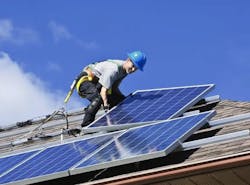How Can Builders Prepare for More Solar?
California has been a leading proponent of solar power for the past decade, and the state energy commission adopted a policy requiring all new single-family homes be equipped with solar starting in January 2020. Other states expected to follow California’s lead include Arizona, Colorado, Hawaii, Nevada, and New Mexico. As similar policies become more prevalent across the United States, homebuilders will need a keen understanding of how solar works.
Consequently, builders must be knowledgeable about solar practices and what differentiates one product from another. Structural dynamics, costs, benefits, and the systemic effects of location and weather, will seem simple when explaining how solar works to your buyers. This Point of View is intended to answer the most common questions buyers will have.
Why should buyers be excited about solar?
Solar saves the homeowner money. A solar powered home costs less to operate and adds value, allowing it to sell more quickly and command a higher value. Thanks to shorter paybacks and great pricing, homeowners can reap all the benefits of solar.
Purchase or lease?
We believe in making the solar experience as simple and cost-effective as possible for both the homebuyer and the builder. There are practical differences in cost, maintenance, terms, opportunities for financial offsets, savings, returns on investment, tax credits, and other items that all have to be carefully explained to buyers whether it’s a lease or purchase.
What has to be communicated to homebuyers?
Homebuyers need to know that return on investment for them is quite significant. The GeoStellar Solar Index shows that solar is a wise investment that can generate more wealth for homeowners in much of the country than treasuries, bonds, CDs, and other investments. As electricity rates rise, so does interest in solar power. For example, our solar systems cost about $.08 per kilowatt-hour with an average six-year payback. Homeowners usually want to see a comparison of the cost per kwh for solar vs. the price per kwh they’re paying the electric company (this is an average in tiered rate structure). The great thing about solar electricity is that calculating costs and savings can be done on a per kwh basis using simple division. From there, it is very easy to demonstrate lifetime savings and payback time frames for each customer.
What do the formulas for savings look like?
We advise against quoting actual savings to potential homebuyers because each household has different habits and usage. Once a system is designed for a home, the homeowner is given the approximate energy that will be generated from their solar system. This number gives them the opportunity to look at a bill from their current home and see what they will save with solar on their new house. Thus, over the days, months and years, the customer recoups the investment through the production offset and corresponding savings.
What are the payback periods for homeowners?
The payback periods have dropped significantly and can be as little as three years. Residents of the top states in the Solar Index can see their investment can be completely paid back in four to six years.
What about resale values?
Solar power can add a tremendous amount of resale value to a home. People are keyed in to what solar energy does for their pocketbook and the efficiency of their home. If a buyer has to choose from a home that has low energy bills versus one that doesn't, it's an easy decision.
All answers should lead back to the main message and that’s the financial bottom line:
• Solar saves the homeowner money.
• A solar-powered home costs less to operate.
• Solar also adds value to the home, allowing it to sell more quickly and command a higher price.
In sum, homeowners can reap all the benefits of solar thanks to shorter paybacks and great pricing. It’s a simple message for builders to communicate that buyers will appreciate: having solar will help save the planet, and they will definitely save on their energy bills at the same time.
Many large builders and their vendors have their marketing and sales professionals well indoctrinated into the mechanics of solar power while medium and smaller builders may not be as well equipped. It would be smart for these builders to affiliate with experts, especially since the marketing and sales staffs will need to be fully informed about solar products and performance.
Being solar smart can substantially boost marketing programs, promote sales and add to the bottom line. Builders who can demonstrate expertise in all aspects of solar and related systems will have a significant competitive advantage over builders who are not as well prepared.

